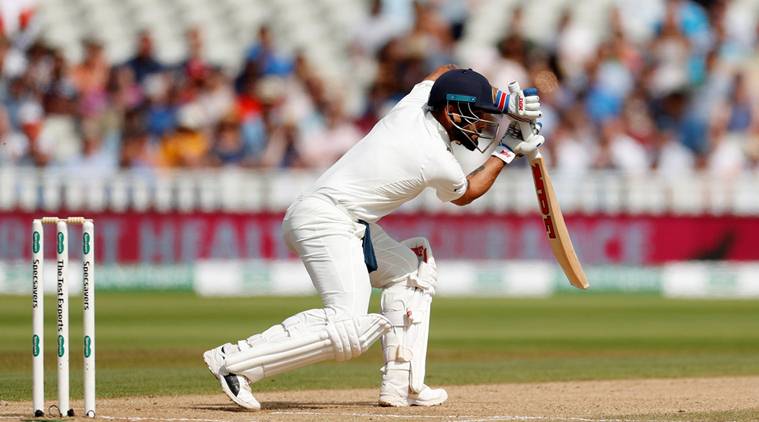 There was something for everyone at Edgbaston: Virat Kohli made a hundred and a fifty; the spinners were in the game; and the pacers got the ball to move. (Source: Reuters)
There was something for everyone at Edgbaston: Virat Kohli made a hundred and a fifty; the spinners were in the game; and the pacers got the ball to move. (Source: Reuters)
“Water, water, water. When you think you have enough water, water it again.” Gary Barwell, the head groundsman of Edgbaston and the real hero of this fascinating Test match, recalls what a mentor once told him. Considering all that fussy foreplay that played out before this game, about the heatwave being the harshest since the 1970s, it was surprising to see how well the pitch played out. It all came down to water in the end.
“I don’t know what the water bill is!” Barwell says with a laugh, an hour after England’s triumph. Amidst that talk about the heat wave, it’s forgotten what transpired in May in these parts of the world. “Cars were floating down the road in Edgbaston,” recalls Neil the chief executive of the cricket association here. Massive floods had hit the city, parts of it were submerged. On May 27, a paramedic Peter Bowles had tweeted that the firefighters and ambulance staff had to swim 50 metres to reach a trapped man. Then came the heat wave. Rains whiplashed the city before the sun microwaved it.
Barwell says he wasn’t worried. He has been doing this from the age of 17. Neil was a touch concerned but knew he could trust Barwell to swing it through for him. “We have a river running nearby from where we can always take,” Neil says. Barwell doesn’t mention the river but talks about how rainwater and the regular water that’s provided to the ground is carefully stored in big tanks all along the ground. It then is fed into the pits that run around the arena, from where a hose-like thing pops up and sprays water. “This is different from normal sprinklers. These can pump in 47,000 litres of water in 35 minutes.”
Barwell and his men have pumped in 150,000 litres of water in a week for sometime now. “Moisture is the key here. Else, the pitch can crack up.” It’s a sand-based ground and water is its oxygen. “If you dig up to four inches, you will hit sand. We have been pumping water to keep this colour,” Barwell says. For weeks now, the little pop-ups from under the outfield and the sprinklers have been drenching the outfield. “If the outfield dries, the moisture would escape from the pitch. It literally cracks and it gets virtually uncontrollable.” All hell would break loose then.
Ten days to go. The sun is still baking the surface and Barwell starts watering the pitch. Every day, through the day, the pitch starts soaking up water. On Sunday night, clouds open up. “We weren’t expecting rain but it did some good.”
Two days before the game, Barwell gets his first feedback. He doesn’t say whether it came from current or former players, but shares the comment: “It looks a bit damp.” It’s clear Barwell didn’t like it. Unsurprising. After all the effort to water up the sun-baked ground, you don’t want to hear the adjective, damp. Better damp than dry, though.
“Two days before the game, we then decide how much grass to keep and carefully monitor the moisture levels.” In the past, he has talked about how this pitch needs 24% moisture, a reading that varies as you go around the country.
Barwell doesn’t sleep well before the Test. “I get all restless.” He wasn’t sure how it would go down at the toss. No one did. “Kohli said he would have bowled, Root obviously chose to bat. I knew the Dukes ball would do a bit but hopefully I had done my job and the surface would hold up.” It did.
Normally, he doesn’t watch the games, prefers to go home and catch it on the telly. But he did watch this Test, and raves about Kohli’s hundred. Time to put up the legs now and relax? “Bit of time with family for couple of days but back here; we got a one-day county game coming up.” No play and all work is what it takes to keep a ground up and running through floods and drought at Edgbaston.